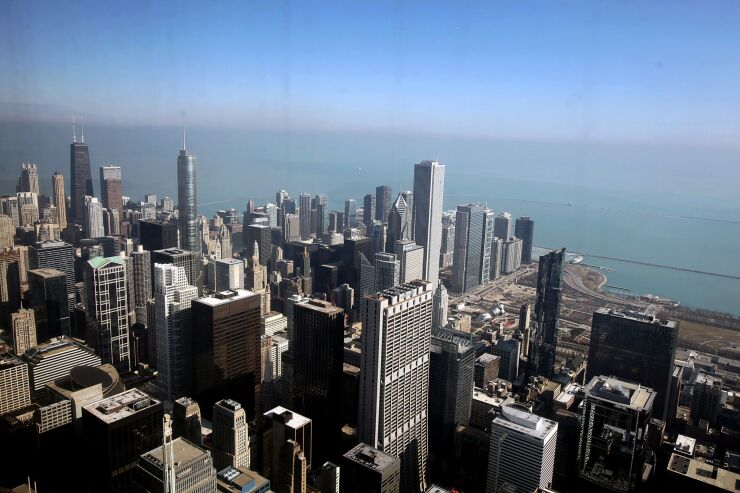Illinois lawmakers are being urged to slow down as they consider pension mandates for Chicago that Mayor Lori Lightfoot's administration warns could add $3 billion to the city's long-term payment tab for its firefighters' fund.
The
While enhancements are likely needed "the Civic Federation is concerned that the state legislature continues to propose legislation that would enhance Tier 2 pension benefits with no evidence that Tier 2 benefits will violate the Safe Harbor rules anytime soon and with no evaluation of the cost," the Chicago Civic Federation said in a blogpost this week urging "legislators and the governor to demonstrate the need for the specific Tier 2 enhancements before taking any binding legislative action."

Benefit enhancements "leave state and local government entities on the hook for funding the added costs, creating additional fiscal hardship for already struggling governments," the federation said, adding that fully restoring benefits to Tier 1 levels, as some stakeholders have argued, "would jeopardize the hard-won financial stability attained over the last several years by Illinois and the city of Chicago and could potentially result in the reversal of recent bond rating upgrades for both governments."
The Chicago firefighter fixes mirror those laid out the state's 2019 consolidation of suburban and downstate police and firefighters' pension assets into a single police fund and single fire fund. They allowed for benefit increases to grow at a faster rate — the lesser of 3% or the inflation rate — from the original Tier 2 formula of the lesser of 3% or one-half inflation. The consolidation also restored the Tier 1 calculation on calculating final average salary.
"There was a promise made that the Chicago funds would receive the same benefit as the suburban and downstate funds," said sponsor Robert Martwick, D-Chicago, who chairs the Senate's pensions committee.
Senate Bill 1630 address the annual benefit formula and Senate Bill 1629 addresses the final salary calculation. The bills have cleared the Senate and are pending before the House. Gov. J.B. Pritzker's administration did not respond to a request for comment on whether he supports them.
The annual benefit increase calculation carries a $3.2 billion net present value (NPV) payment cost through 2055 when the city's public safety plans are slated to reach a 90% funded ratio. The final pensionable salary calculation carries a $114 million NPV payment cost, according to Chicago's Chief Financial Officer Jennie Huang Bennett.
"Both of those are very expensive" and would be among the largest "pension sweeteners in the history of Illinois," Bennett said.
The city doesn't yet have an estimate on the cost of a pending bill that is further behind in the approval process to raise Tier 2 police benefits.
Lightfoot pushed back against the legislation late last month during a presentation of an updated fiscal forecast. "We don't need a bunch of unfunded mandates for pensions," Lightfoot said.
Additional costs will fall on Mayor-elect Brandon Johnson who will be sworn into office May 15th.
A sweeping overhaul of Cook County's pension fund — that will formally incorporate the supplemental contributions the county has been making that bring its payments up to actuarial levels — also is expected to have a Tier 2 fix.
County Board President Toni Preckwinkle said the county did not yet have a price tag for the fix although that bill — SB 1690 — is unlikely to move forward until the county, labor, and pension fund agree to terms.
"We don't have an agreed bill as yet" and discussions "with the pension board are ongoing. We hope to come to an agreement" to get a bill passed, Preckwinkle said Wednesday after meeting with lawmakers. Negotiations remain ongoing over Tier 2 changes on the pensionable salary cap, updating military service guidelines and pension board composition that would give the county a greater say.
With burgeoning unfunded pension liabilities straining the state and local governments and benefits for current employees protected by an airtight state constitutional clause, lawmakers passed Tier 2 legislation in 2010 reducing benefits for most public pension funds statewide. Local and state funds combined carry more than $210 billion of unfunded liabilities.
In addition to the pensionable salary and salary cap limits, the new tier raised the retirement age to receive full benefits. Stakeholders widely agree that Tier 2 fixes will eventually be required. A 2019 estimate put the cost for the state's five funds alone at $2 billion. If pensions fall short of the safe harbor rule, the state would face penalties and employees could sue.
The city's fix carries net pension liabilities of $33.7 billion. The firefighters' funded ratio is just 20.93% funded, while the police funded ratio is at 23.54%, the municipal fund is 23.41% funded, and the laborers is 45.92% funded. The city's sister agencies have additional unfunded liabilities.
Cook County has a $6.3 billion tab and funded ratio of 67.2%. Suburban and downstate public safety funds carry collective unfunded liabilities of $13 billion and an average funded ratio of about 44% to 45%.
Lightfoot has pushed back against other state actions on pensions to no avail. Over Lightfoot's objections, Pritzker
The enhancement for some Chicago firefighters adds $180 million to the fund's existing $5.29 billion of unfunded liabilities and $16 million to $17 million in additional annual costs that add up to $700 million by 2055, according to a 2022
Bennett has warned the similar tab for police, if





